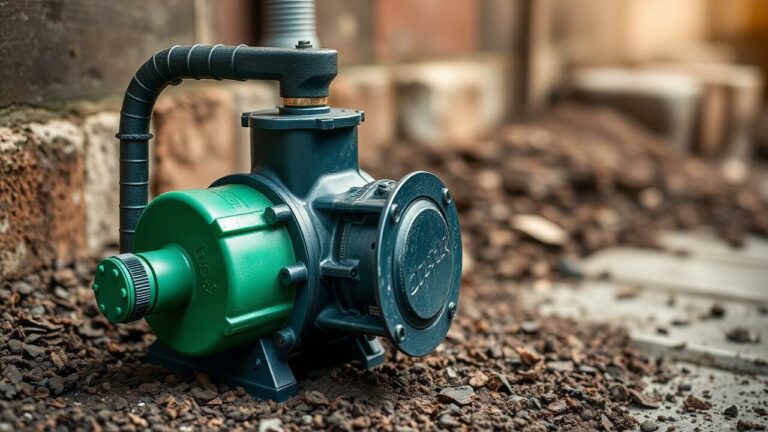Understanding the Role of the Septic Tank in Pumping System
Table Of Contents
Understanding the Role of the Septic Tank in Pumping Systems and the Importance of Septic Tank Pumping
Key Takeaways
- Summary of septic tank functions and significance in waste management.
- Explanation of the septic tank’s contribution to pumping systems and their operations.
- Description of the process involved in septic tank pumping and its importance.
- Overview of various types of septic pumps available in the market.
- Insight into frequent problems encountered with septic pumps and their resolutions.
- Importance of consistent upkeep for septic tank systems to ensure efficiency.
Overview of Septic Tanks
A septic tank is a crucial component of an efficient waste management system, serving as the initial treatment unit for household wastewater. Understanding the role of the septic tank in pumping systems is essential, as it separates solids and liquids, allowing for the breakdown of organic matter. The liquid waste, known as septic tank effluent, is then directed to a leach field or pump station for further treatment. Regular septic tank cleaning is vital to prevent clogs and ensure proper functioning of the septic system. With various options available, such as submersible pumps, homeowners must recognize the importance of maintaining their septic tanks to avoid costly repairs and extend the lifespan of their sewage systems.
Components of a Septic Tank System
A septic tank system primarily consists of an underground storage tank and a network of pipes, valves, and pumps designed to treat household wastewater. The underground storage tank serves as a first-level separator, allowing solids to settle at the bottom while liquids flow out. Essential components of this system include the inlet and outlet pipes, which connect the tank to the home and leach field, and valves that control the flow of wastewater. Ejector pumps are vital when gravity cannot effectively move wastewater out of the tank, and submersible water pumps can also be used for transporting effluent to the treatment area.
Understanding the Role of the Septic Tank in Pumping System hinges on the efficient operation of these components. Valves help regulate the flow and prevent backflow, ensuring proper drainage from the tank. The selection of the right type of pump, such as a submersible water pump or ejector pump, is crucial for optimal system performance. Correctly functioning pumps prevent backups and overflows from the storage tank, safeguarding both the property and the environment. Regular maintenance of these components is essential for prolonging the life of the septic system and maintaining its efficiency.
How Septic Tanks Operate
Septic tanks operate by facilitating the process of breaking down waste within a confined environment. Wastewater from households flows through pipes into the tank, where solids settle to the bottom and are decomposed by anaerobic bacteria. Non-return valves prevent backflow, ensuring a continuous flow toward the drainage system. A packaged pump station might be included in some setups to manage the effluent that needs to be pumped to a higher elevation. Gate valves play a crucial role in controlling the flow of effluent, while check valves are essential to keep the flow unidirectional, preventing any contamination of the sewer systems.
Understanding the Role of the Septic Tank in Pumping Systems is vital for effective waste management. In some cases, a grinder pump is required to break down solids before they are moved into the sewer system. This pumping mechanism becomes particularly important in areas with inadequate gravity flow. Drain cleaners can also be utilized periodically to maintain clear pipes and ensure optimal operation. Regular maintenance and timely pumping are necessary to prevent system failures, ultimately protecting the functionality of the drainage system.
Understanding the Role of the Septic Tank in Pumping Systems
The importance of the septic tank in waste management cannot be overstated. It serves as a critical component of sewage systems, facilitating the initial breakdown of organic matter. Within the tank, pressure builds as fluid accumulates, prompting the movement of wastewater toward the drain field. This process is essential for effective disposal and treatment of sewage, preventing harmful gases from escaping into the plumbing system. In situations where gravity alone cannot carry the wastewater away, a sump pump may be employed to assist in transporting fluid to the drainfield. Regular maintenance and timely service by an electrician are crucial to ensure that the septic tank operates efficiently, safeguarding the integrity of the entire sewage system.
Importance of the Septic Tank in Waste Management
Septic tanks play a crucial role in waste management by effectively treating sewage from homes before it returns to the environment. Understanding the role of the septic tank in pumping systems is essential for homeowners to ensure proper functioning. A septic tank system receives waste from various sources, including the toilet, and separates solids from liquids. Proper maintenance of these systems reduces the risk of backups and environmental contamination. Regular septic tank pumping and timely service can prevent disruptions and extend the lifespan of the entire system, including the septic tank pump, hose, and power cord.
Routine maintenance is key in upholding the efficiency of septic tank systems. Homeowners should prioritize understanding the role of the septic tank in pumping systems to grasp how neglect can lead to costly repairs. A failing septic tank pump can result in serious issues, such as raw sewage surging back into the home or yard. Regular inspections and pump-outs not only enhance waste management but also significantly contribute to the safe disposal of sewage. By keeping septic tank pumps in optimal condition, homeowners can avoid potential hazards associated with improperly managed waste systems.
Connection Between Septic Tanks and Pumping
Septic pumping plays a crucial role in maintaining the efficiency of a septic system. Understanding the Role of the Septic Tank in Pumping System is essential for homeowners. A well-functioning septic tank needs regular pumping to prevent solids from accumulating and obstructing the septic tank outlet. Timely septic tank service ensures that waste is effectively processed, reducing the risk of septic pump issues. Ignoring these needs can lead to costly septic tank replacement and extensive damage to the entire system.
Septic pumps are vital components that facilitate the proper movement of wastewater from the septic tank to the drain field. Regular septic tank maintenance, including monitoring the condition of the pump, helps in identifying potential problems early. Homeowners should be aware of the indicators of septic pump issues, such as strange noises or slow drainage. By being proactive and scheduling routine septic tank services, homeowners can extend the lifespan of their septic systems and avoid major inconveniences.
Septic Tank Pumping Explained
Septic tank pumping is a critical aspect of maintaining an effective waste management system. Understanding the role of the septic tank in pumping systems ensures that the septic tank sits properly within the designated septic tank site to facilitate efficient operation. Regular pumping helps remove solids that accumulate and prevents the system from overwhelming the septic effluent pump. Engaging a reputable septic tank supplier or seeking help from local septic tank companies can ensure proper septic tank installation and timely septic tank repairs. This proactive approach minimizes the need for septic pump repair and contributes to the longevity of the entire septic system drain. Proper septic tank treatment is vital for maintaining a healthy and functional system, preventing costly issues down the line.
| Service Provider | Location | Services Offered | Contact Number |
|---|---|---|---|
| ABC Septic Services | Springfield | Pumping, Installation, Repair | (123) 456-7890 |
| Septic Solutions Inc. | Riverdale | Pumping, Inspection, Maintenance | (234) 567-8901 |
| Green Earth Septics | Lakeside | Pumping, Treatment, Disposal | (345) 678-9012 |
| Reliable Waste Management | Hilltown | Installation, Repair, Pumping | (456) 789-0123 |
When and Why Septic Tank Pumping is Necessary
Septic tank pumping is essential for maintaining the efficiency of a septic system, ensuring it operates smoothly without any disruptions. Understanding the role of the septic tank in the pumping system helps homeowners grasp why regular cleanouts are necessary. Over time, solid waste accumulates in the tank, which can lead to septic pump failure if not addressed. A septic pump fails when it becomes overwhelmed with excess sludge and sediment, resulting in septic fluid backing up into the property or the need for costly repairs.
Regular pumping is crucial for both residential and commercial septic systems, promoting optimal functionality. The septic system works effectively when it has the appropriate balance of solid waste and liquid. Neglecting routine maintenance, such as pumping and checking septic tank filters, may lead to the septic grinder pump becoming clogged or malfunctioning. Properly timed cleanouts help extend the lifespan of the system and prevent unexpected failures, aligning with the principle that a well-maintained septic system relies on proactive care.
Factors Affecting the Frequency of Septic Pumping
The frequency of septic pumping is influenced by several factors, including the size of the septic tank and the number of people using the system. Understanding the Role of the Septic Tank in Pumping System is essential for recognizing how often pumping may be required. For instance, larger families may produce more waste, increasing the need for regular septic tank inspections and the pumping process. Septic tank technicians often recommend frequent pumping to ensure that accumulated sludge, scum, and liquid do not exceed capacity.
Another critical factor is the overall health of the septic system and how well it moves waste from the septic tank to the drain field. Regular septic tank inspections can help identify any potential issues before they necessitate septic system replacement. Neglecting the need for septic pumping can lead to clogs or backups that require more extensive repairs. The right maintenance routine, including understanding the optimal pumping frequency, will support the longevity and efficiency of the pump system.
Types of Septic Pumps
Understanding the different types of septic pumps is crucial for effective septic system maintenance. The choice between submersible and effluent pumps can directly impact the pumping volume and overall efficiency of the system. A reliable pump is essential for ensuring that the pump chamber operates correctly, thereby facilitating proper waste management. Regular pumping is necessary to prevent backups, and being aware of a septic tank alarm can help indicate potential issues. Consulting with septic system professionals can aid in selecting a new pump tailored to specific needs. Prioritizing routine pumping and understanding the role of the septic tank in the pumping system ensures long-term septic system care and efficiency.
Submersible vs. Effluent Pumps
Submersible pumps are designed to operate underwater within the pump chambers of a septic system. This type of pump efficiently handles waste by pushing it through the drainage field, ensuring that the septic system meets its septic needs. Understanding the role of the septic tank in pumping systems is vital for maintaining an effective and reliable waste management solution. A functioning pump is crucial for keeping the overall system operational, and proper septic service can help identify appropriate pumps for specific applications.
Effluent pumps, on the other hand, are typically used to transport wastewater from the septic tank to a drain field or more elevated areas. These pumps are specially designed to handle less solid waste, making them ideal for situations where waste needs to be pumped uphill. Regular septic service can help residents troubleshoot any septic issues that arise, ensuring a proper pumping schedule is maintained. Timely pump-out services can prevent costly repairs and extend the life of the septic system.
Choosing the Right Septic Pump
Selecting the right septic pump is crucial for maintaining an efficient septic system. Understanding the Role of the Septic Tank in Pumping Systems helps homeowners recognize the importance of various components, including the main tank and separate pump chamber. A properly sized lift pump ensures that the pump load matches the system’s requirements. It’s essential to consult with a reputable septic service provider to evaluate the setup, which includes conducting a septic system inspection to identify existing or potential septic issues.
Consideration of the specific needs of your system is necessary when choosing a septic pump. The right pump can significantly impact the longevity and efficiency of the entire system, as well as the ease of septic cleaning and timely septic-related services. Homeowners should prioritize options that align with their tank’s specifications and the capacity required for effective waste management. This proactive approach can prevent complications and ensure the long-term functionality of the tank chamber and connected systems.
- Determine the size and capacity requirements of your septic system.
- Research different types of septic pumps, such as submersible and effluent pumps.
- Evaluate pump materials and durability to withstand environmental conditions.
- Check for necessary certifications and warranties from manufacturers.
- Consult local building codes and regulations regarding septic systems.
- Seek recommendations from professionals or homeowners with similar systems.
- Consider energy efficiency to reduce operational costs over time.
Common Septic Pump Issues
Septic pump issues can arise from various sources, making it essential for homeowners to be vigilant. Understanding the Role of the Septic Tank in Pumping Systems reveals that proper septic waste disposal relies heavily on pump efficiency. Problems can stem from a failing previous pump, whether it be an effluent pump or a submersible water pump. Electrical water pumps may experience disruptions that affect performance, while standard stock pumps and sewage ejector pumps have their own unique challenges. Regular inspections by septic service technicians help identify signs of trouble, such as unusual noises or decreased flow, which can signal the need for a replacement tank or adjustments to the system. Keeping an eye on the function of dirty water pumps ensures that all components work together effectively for optimal waste management.
Identifying Signs of a Failing Septic Pump
Recognizing the early signs of pump failure is essential for effective septic maintenance. A malfunctioning sewage ejector pump may exhibit unusual noises or vibrations during operation, which could indicate an underlying issue. Regularly checking the drain pipes for blockages can help identify potential problems before they escalate. Understanding the Role of the Septic Tank in Pumping Systems is crucial, as it helps to ensure the main drainage pipe functions properly. If issues like slow drainage or backup occur, it may be time to schedule pumping services to clear the outflow pipe and prevent further complications.
Monitoring certain indicators can also aid in determining the health of your septic system. An effluent pump buyer should be aware of the pump’s capacity and performance. Frequent tank cleaning might be necessary if debris accumulation affects functionality. Signs such as slow sink drainage or sewage odors around the septic area also suggest an urgent need for professional inspection. By understanding the role of the septic tank in pumping systems and addressing any warning signs early on, homeowners can effectively protect their investment and maintain a healthy wastewater management system.
- Unusual noises or vibrations coming from the pump
- Slow drainage or frequent backups in drains
- Foul sewage odors near the septic system area
- Visible signs of sewage surfacing in the yard
- Increased frequency of tank cleaning requirements
- Discoloration or sluggishness in water flow around fixtures
- Presence of standing water near the septic area
Troubleshooting Septic Pump Problems
Understanding the functioning of various underground systems is crucial for identifying septic pump issues. Different tanks, such as two-compartment tanks, may exhibit unique problems related to their configurations and flow dynamics. Clogs in sewer pipes or blockages in pipework can restrict the movement of wastewater, leading to pump failures. The presence of necessary gate valves can also affect the performance of the system. A septic service appointment can help assess the tank size and the overall health of the entire setup.
Recognizing indicators of pump malfunctions is key to maintaining an efficient septic system. Obstructions in perforated pipes can hinder the drainage process, causing stress on the pump. Unusual noises or frequent cycling of the pump often signal underlying issues that need attention. Regular inspection of the underground chamber and its connections will enhance reliability. Proper maintenance ensures that the septic system operates efficiently while fulfilling its vital role in waste management.
Regular Maintenance of Septic Tank Systems
Effective maintenance is crucial for ensuring that septic tank systems function properly. Understanding the Role of the Septic Tank in Pumping Systems provides insight into how regular upkeep can prevent issues like system overflows or backups. The components such as chemical pipes, subsurface pipes, and drainlines require inspection to ensure they remain clear and functional. A giant suction hose or large hose is often used during pumping to remove waste efficiently, preventing the accumulation of sludge that can lead to costly repairs. Regular service checks can help identify when the chamber fills are nearing capacity, ensuring timely action is taken before problems escalate. Owners should also consider general plumbing services that can assist in maintaining the system’s integrity, especially if they are connected to a municipal sewer system. Understanding these elements can significantly prolong the life of the drainage system, including the drainfield, and prevent the need for expensive replacements.
Importance of Septic Tank Service
Regular septic tank service is crucial for maintaining the overall health of your waste management system. Understanding the Role of the Septic Tank in Pumping System hinges on the efficient operation of various components, including inlets and chambers that allow for effective drainage. Over time, solids and sludge accumulate within the tank, impacting its capacity. Professional service focuses on removing the solids and sludge that have built up in your tank to ensure the system functions optimally. This process not only helps to push water through the system effectively but also prolongs the lifespan of the drainfield, preventing costly drainfield restoration.
Septic systems require a careful balance to operate efficiently. A well-maintained tank ensures that waste flows smoothly through separate drains and chambers within the system. If the service is neglected, the potential for backflows, clogs, and overflows increases, leading to costly repairs and disruptions. Understanding the Role of the Septic Tank in Pumping System includes recognizing how regular maintenance can prevent these issues, ensuring the system can handle its intended volume, often measured in gallons. By investing in routine service, homeowners can avoid significant complications and ensure their septic system functions effectively for years to come.
| Service Type | Frequency | Benefits |
|---|---|---|
| Professional Pumping | Every 1-3 years | Removes accumulated solids to prevent overflow and backups |
| Inspection | Annually | Detects potential issues early before they escalate |
| Maintenance | As needed | Ensures optimal functioning and extends the lifespan of the system |
| Drainfield Care | Ongoing | Prevents clogs and maintains effective wastewater treatment |
Recommended Septic Tank Services for Longevity
Regular maintenance of septic tank systems is essential for their longevity. This includes routine inspections that help identify potential issues early. Understanding the Role of the Septic Tank in Pumping System is crucial in preventing costly repairs. Direct connections to city sewer systems can complicate matters if not properly maintained. A well-functioning septic tank with the appropriate layers allows for effective waste breakdown before it enters the drains.
Periodic service can involve pumping out sludge buildup, which is vital to keep the system operational. Any delay in maintenance can lead to severe complications and repairs that might require extensive work. Understanding the Role of the Septic Tank in Pumping System also involves recognizing how external environmental factors can impact the system’s efficiency. Keeping up with maintenance schedules ensures that the septic tank operates smoothly, extending its lifespan and reducing the likelihood of unexpected failures.
Conclusion
Understanding the Role of the Septic Tank in Pumping Systems is essential for effective waste management. Regular septic pumping is key to maintaining a healthy septic system, as neglect can lead to significant septic pump issues or even necessitate septic tank replacement. Homeowners must be aware of their septic tank needs, including how often septic tank services should be scheduled and what routine septic tank maintenance involves. A well-functioning septic pump is crucial for the proper operation of the septic tank outlet, facilitating the movement of waste. By prioritizing septic tank service and being proactive about potential septic pump problems, homeowners can ensure the longevity and efficiency of their septic systems.
FAQS
How does a septic pump work in relation to what a septic tank needs for proper function?
A septic pump isn’t just an accessory; it’s crucial for how septic systems work. The septic tank prevents overflows and helps with the separation of waste, while septic pumping removes the accumulated sludge, scum, and liquid from a septic tank. For effective septic maintenance, it’s essential to keep the system maintained through regular septic tank cleanouts and ensure that the pump installation is performed correctly, especially if you’re considering a new drainfield.
How do pump systems work in conjunction with a giant tank to ensure effective septic maintenance prevent issues?
Pump systems work by transferring wastewater from the giant tank to the drainage field or treatment area, which is essential for proper septic maintenance. To prevent problems, regular checks and maintenance of both the pump systems and the septic tank are necessary to ensure efficient operation.
What measures can be taken for effective septic maintenance to prevent future problems?
To ensure effective septic maintenance and prevent potential issues, it is crucial to schedule regular inspections, pump the septic tank as needed, avoid flushing non-biodegradable items, and be mindful of water usage in the household.
What steps can homeowners take to ensure proper septic maintenance to prevent costly repairs?
Homeowners can ensure proper septic maintenance by regularly inspecting the system, pumping the tank every 3 to 5 years, avoiding flushing non-biodegradable items, and being mindful of water usage to prevent overloading the system. Regular septic maintenance can help prevent costly repairs and extend the life of the septic system.
What are the best practices for septic maintenance to prevent system failures?
Implementing best practices for septic maintenance can significantly help prevent system failures. Regular pumping of the septic tank, inspecting the drain field, and mindful usage of water are essential actions homeowners can take to ensure that their septic systems function properly. Additionally, using appropriate septic-safe products and avoiding flushing harmful substances contribute to effective septic maintenance to prevent costly repairs and system breakdowns.
What strategies should homeowners implement in their septic maintenance to prevent costly failures in their septic systems?
Homeowners should regularly inspect their septic systems, pump the septic tank every 3-5 years, and avoid flushing non-biodegradable materials to ensure effective septic maintenance to prevent costly failures.
What can homeowners do to ensure that their septic systems are running efficiently and to help prevent the need for costly repairs?
Homeowners should focus on effective septic maintenance to prevent issues such as backups and costly repairs. Regular inspections, adequate pumping intervals, and mindful usage of household products can all contribute significantly to maintaining a healthy septic system and preventing unexpected failures.
What are some tips for homeowners to maintain their septic systems and prevent future issues?
For effective septic maintenance, homeowners should regularly check for signs of trouble, avoid flushing non-biodegradable items, pump their septic tank as recommended, and ensure proper drainage around the system to help prevent costly repairs and system failures.
What are the consequences of inadequate septic maintenance that could lead to system failures?
Inadequate septic maintenance can lead to various problems such as clogging of the system, overflow, and even complete system failure, which can be quite costly to repair. Regular septic maintenance helps prevent these issues, ensuring that the septic system operates properly and effectively, thereby preventing the need for major repairs.
What actions can homeowners take to ensure proper septic maintenance to prevent issues?
Homeowners can implement several strategies for effective septic maintenance to prevent problems, including regular inspections, pumping the septic tank when needed, and being mindful of what goes down the drain. Following these practices helps maintain the system’s efficiency and prevents costly repairs in the future.







